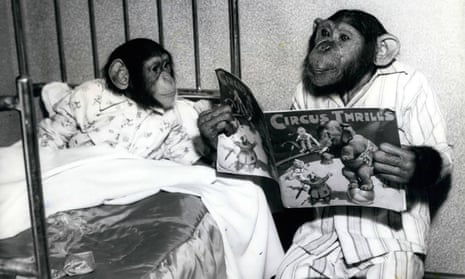Your lily-white bed linen may, in fact, be less hygienic than the nest of an animal known for throwing its own poo around. According to a new study by researchers from North Carolina State University, chimpanzees have cleaner sleeping arrangements than humans – and that may be precisely because we insist on using the same sheets over and over.
More than a third of the bacteria found in human beds is from our own bodies, be it skin, oral or faecal. PhD student Megan Thoemmes, the lead author of the paper, which was published in the journal Royal Society Open Science, said she and her colleagues “wanted to know how this compares with some of our closest evolutionary relatives”.
Chimpanzees build fresh beds from branches and leaves every day. Thoemmes led a team of researchers collecting swabs from 41 such chimp nests in Tanzania and found they contained significantly fewer body bacteria than a bed in the average human household. “We found almost none of those microbes in the chimpanzee nests, which was a little surprising,” she said.
Even when they searched for arthropods such as fleas, lice and ticks in 15 of the nests, the scientists came up almost empty-handed. “There were only four ectoparasites found, across all the nests,” Thoemmes said. “And that’s four individual specimens, not four different species.”
It has been estimated that up to a third of the weight of a person’s used pillow could be comprised of dead skin, dust mites and their feces. A standard household’s duvet could contain some 20,000 mites, while a typical used mattress may hold anything up to 10m of them. Although the chimp nests were found to contain a more diverse selection of microbes, those microbes appeared to come from the nests’ surroundings, not from the chimps themselves.
The NCSU study concludes that humans “have created sleeping places in which our exposure to soil and other environmental microbes has all but disappeared, and we are instead surrounded by less diverse microbes that are primarily sourced from our own bodies”.
And that may have increased our vulnerability to allergies and other health conditions. “In some ways,” said Thoemmes, “our attempts to create a clean environment for ourselves may actually make our surroundings less ideal.”

Comments (…)
Sign in or create your Guardian account to join the discussion